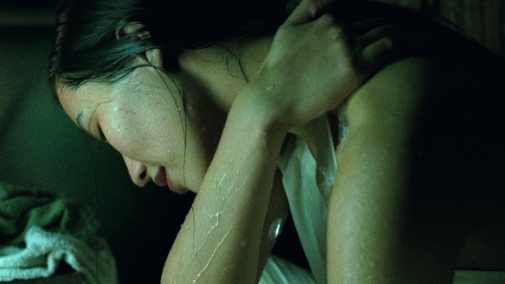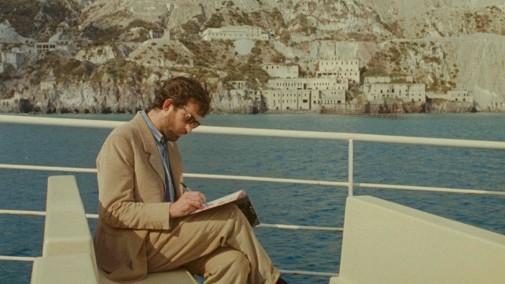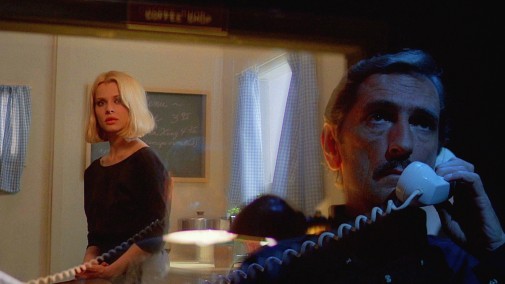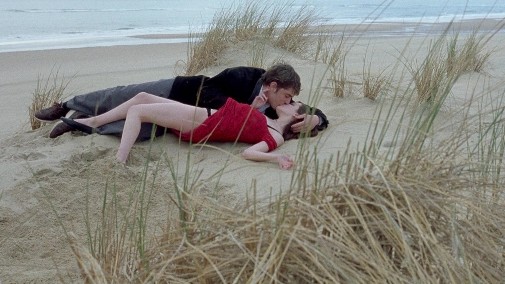Just as the favorites for the Palme d'Or seemed to have settled, here comes another barrage of rave reviews to muddy the waters. Not only is it impossible to predict what Östlund's jury will choose, but it seems like, every day, the critics elect a new title to champion. On the ninth day of the festivities, Trần Anh Hùng's Pot-au-Feu dazzled many with its gastronomic love affair, making comparisons to Babette's Feast. Then came Nanni Moretti's A Brighter Tomorrow, less acclaimed but blessed by enthusiast defenders. On the 10th day of Cannes, it was time for Wim Wenders' Perfect Days to ignite Best Actor speculation, while Catherine Breillat's Queen of Hearts remake became another instant frontrunner for the big prize. Will Last Summer take the Palme?
For the Cannes at Home series, the focus shall be on these auteurs' past festival successes. The Scent of Green Papaya earned Hùng the Camera d'Or and Vietnam its only Oscar nomination. Moretti won the Best Director prize at Cannes '93 with Caro Diario, and Wim Wenders was the Palme victor of '84 with Paris, Texas. Finally, there's Breillat's hyper-controversial Fat Girl, a prizewinner from the 51st Berlinale…

THE SCENT OF GREEN PAPAYA (1993) Trần Anh Hùng
The motions of everyday life make up the foundations of a cinema somewhere between ritual and poetry. Trần Anh Hùng films domestic action with ceremonial diligence, finding ways of making shots rhyme and behavioral patterns turn into cyclical verses to be sung in silence. There's also something impressionistic in how his camera captures light refracted over domestic spaces, how the proximity between the gaze and its subject can render familiar things unreal. So grand is this audiovisual ravishment that matters of narrative become superfluous, a nuisance to be blotted out by a director for whom mood is always above plot.
That's true here, in his feature debut, whose confident construction feels incompatible with the preconceived idea of a novice filmmaker. The Scent of Green Papaya is a most assured work detailing the life of Mùi, who we meet as a little girl in 1951 Saigon. There, she becomes the newest servant of a once-wealthy household now teetering on the edge of class demotion. We observe her often silent labor, and as the years pass, the camera shall follow her out of this home into another. There, the story is very different, more about a young man's evolving affections than family dynamics. From domestic portraiture, The Scent of Green Papaya becomes a love story.
More importantly, it becomes virtually dialogue-less, a talkie on the threshold of silent cinema technique, where emotions are detailed not through words but by gestures and piano variations. For those like me, who yearn for a return of such filmic idioms, this last act is delicious beyond words, even when the sparse narrative can't help but double down on conservative notions of womanhood and social structures. Hùng is an elegist with a soft twist, willing to meditate on sorrows but always ready to enjoy sunlight wherever it might shine. No wonder Benoît Delhomme's lensing is so pleasantly warm, humble yet splendorous.
The Scent of Green Papaya is streaming on Hoopla, Kanopy, Metrograph, and the Cohen Media Amazon Channel. You can also rent it on Vudu, Kino Now, and Amazon Video.

CARO DIARIO (1993) Nanni Moretti
In one way or another, every Nanni Moretti film is about its auteur. It's been this way since the beginning, when the Italian director dedicated his first three features to a thinly-veiled caricature of himself rebaptized as Michele. And yet, there's often that smokescreen of fictionalization separating the person behind the camera from the man in front of it, sometimes a twist of absurdity or a touch of pointed exaggeration. Caro Diario follows the usual motions, turning Moretti into character, but its approach is distinct. The membrane separating truth and falsity is more porous than ever, the film presented as three episodes taken straight from the cineaste's diary.
The result is an odd little picture that showcases the director's righteousness without attempting to discredit its moralizing ways as a mere character beat. Still, all the judgment that comes through is tempered with good humor and a good dose of self-awareness, formulating a rueful tone that's as prone to fall into humorous dejection as vulnerable melancholy. Also, it's legitimately funny, Lina Wertmüller shade and all, with an unexpected Jennifer Beals cameo and a blissful interlude where a former snob becomes addicted to American soap operas. One can feel Moretti dodging the didacticism that mars his worst pictures, keeping things light throughout, complete with an ironic grin.
It's not all funny business intercut with sorrow, but a malleable thing that often shapeshifts within its chapters – On My Vespa, Islands, and Doctors. Take the first section, for example, moving from a Roman travelogue to a consideration of Pasolini's legacy, a wordless pilgrimage to the place of his murder. Then there's the Stromboli interlude in the middle story, juxtaposing the path Bergman followed in Rossellini's masterpiece with an addict's need for his latest televisual fix. Doctors is more straightforward but also more radical in its appeal to real-life documentation, sometimes leaving restaging behind for candid camera footage.
Five years after Caro Diario, Moretti would return to this diarist model with Aprile, a more hectoring variation with some added fantasy and formal invention. Still, something about the admitted obnoxiousness of the '93 movie elevates it above the follow-up. Nevertheless, both films are worth your time if you're looking to get into Moretti's odd cinema as both mirror, confession bound by a moral imperative, comedy couched in unvarnished honesty about the self.
Caro Diario is streaming on the Roku Channel, Hoopla, Tubi, Kanopy, MUBI, and Film Movement Plus. You may also find it on the major platforms, available to rent and buy. Aprile, however, is streaming exclusively on Kanopy.

PARIS, TEXAS (1984) Wim Wenders
A particular and endlessly fascinating subset of films - many premiered at Cannes - considers America through the prism of an outsider's POV. You'll usually find a European artist behind it, as is the case of Paris, Texas, where the prodigal son of the German New Wave trades the landscapes of the Old Continent for the American Southwest in all its rocky glory. Detachment overwhelms the screen, empty vistas painted in crayon shades by DP Robby Müller, simultaneously extolling the mythos of the place and defamiliarizing it. The desert is a swath of ochre against blinding blue, an all-consuming void just as empty as the hero's memory.
Straight from Sam Shepard's imagination, he's Travis Henderson, an amnesiac who drifts, like those eponymous figures of the Old West, wanderers out of society. In our man's case, he's trying to find his way back in - into civilization and the family he's lost. And so, a never-better Harry Dean Stanton roams his way across desolation, natural and man-made, in search of what might forever be out of reach. In his story, Wenders delineates a eulogy and a deconstruction, a chronicle of modern loneliness that takes on a country's oft-exported iconography as a parallel protagonist. Maybe it's a palimpsestic one, juxtaposed over Travis, fragments of each poking through the other.
Describing the mix of minimalism and robust formalism can be challenging, for Paris, Texas feels like a film with no close relative. It's isolated in the wilderness of cinema, audiovisually precise but never sharp, ready to embrace the characters with affection though it can never fully grasp them. That mystery is by design, masterfully brought to a boil in the picture's third act, when the wide open recedes so that a dark chamber can overtake the screen. Watching Stanton and Nastassja Kinski separated by a one-way window is to witness two lost souls, so close yet so far. It's one of cinema's great duets, devastating and beautiful, gentle in its mercilessness.
Paris, Texas is streaming on HBO Max and the Criterion Channel. You can also find it on Apple TV and Amazon Video, available to rent or purchase.

FAT GIRL (2001) Catherine Breillat
Every single one of Breillat's cinematic efforts is a little bit shocking and uncompromising, with radical intentions and risqué depictions of sexuality. Even so, something about Fat Girl transcends the spark of instantaneous outrage or the potential accusations of juvenile provocation. It starts innocently enough – though innocence is always relative in this auteur's films – with a naturalistic study on sisterly bonds, the love-hate relationship that can blossom between two siblings going through adolescence at asynchronous tempos. They're thirteen-year-old Anaïs and her fifteen-year-old sister Elena, both on vacation by the French seaside with their single mother.
Such holidays provide a limbo where honesty flows more easily than it might in regular life, boredom inciting recklessness. Overweight and deeply aware of how others perceive her, the younger woman has a dispassionate view of sex, while Elena holds on to romantic notions. That idealism puts her on the path to deflowerment at the hands of an Italian lothario, promises of devotion a horny man's con. The scene when it happens is upsetting in its frankness, and it must have been a nightmare to shoot. Indeed, a year later, Breillat would fictionalize the ordeal in the meta-cinema masterpiece Sex Is Comedy.
However, this is no explicit subversion of Rohmerian tropes, but something darker, leading to an out-of-nowhere finale whose violence stays with you, a cinephile's scar slashed across the consciousness. It's unbearably nihilistic, but, as in her depictions of Elena and her beau's intercourse, there's an odd purity to be found in Breillat's evil denouement. In this paradigm where words are lies and bodies truth, where the fear of being obscene is what makes art obscene, Fat Girl is a needed confrontation with a self-deluded mainstream. To me, it's long been a brutal epiphany of a film, one that helped me recognize and articulate neuroses of youth, a bitter pill to swallow that'll burn a hole through your soul if you're not careful with it.
Fat Girl is streaming on HBO Max and the Criterion Channel. You can also find it on Amazon Video, Apple TV, and Vudu, available to rent or purchase.
Do you have any predictions for the jury prizes at this year's Cannes Film Festival?